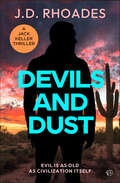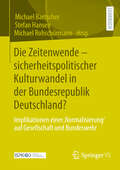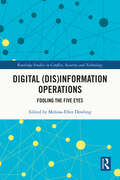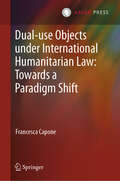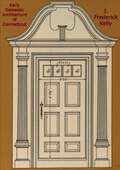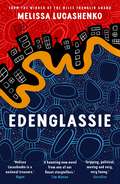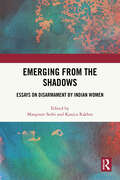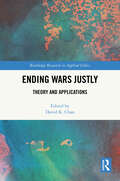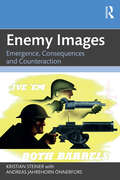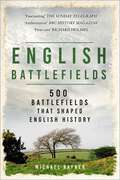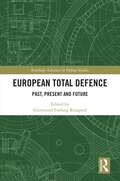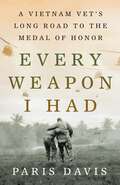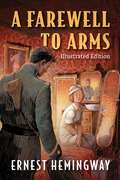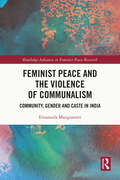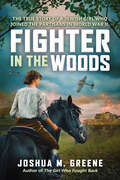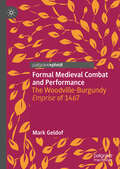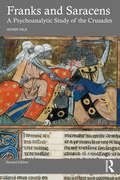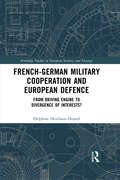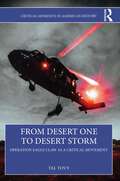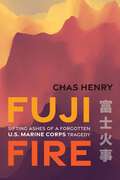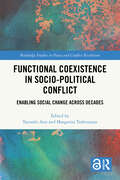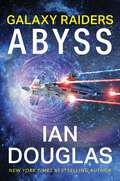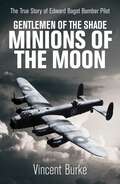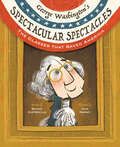- Table View
- List View
Devils and Dust (The Jack Keller Thrillers)
by J.D. RhoadesFourth in the critically acclaimed series featuring bounty hunter Jack Keller, &“a fun character to root for and more than a little reminiscent of Jack Reacher&” (Library Journal). After years in exile, living a quiet life in the desert, Keller is pulled back into the fray when Angela—his friend and former employer—tracks him down with a desperate plea for help. Oscar Sanchez, Angela&’s husband and Keller&’s best friend, has vanished while searching for the sons he was trying to reunite with their family. As Keller dives into the investigation, he&’s forced to confront not only ruthless human traffickers, drug lords, and a violent white supremacist cult, but also his own buried demons—and his unresolved feelings for Angela. From the brutal border towns of Mexico to the swampy prison camps of South Carolina, Keller will face enemies driven by greed, power, and a twisted sense of righteousness. But one thing is certain: when Jack Keller is on your trail, he&’s not just bringing justice—he&’s bringing hell with him . . . &“For fans of high-octane thrillers that don&’t ignore character development, Rhoades belongs on the same reading list with Stephen Hunter, Lee Child, and Randy Wayne White.&” —Booklist &“Rhoades&’ skill will keep readers going.&” —St. Louis Post-Dispatch &“Excellent . . . a real page-turner.&” —Mystery Scene
Die Zeitenwende – sicherheitspolitischer Kulturwandel in der Bundesrepublik Deutschland?: Implikationen einer ,Normalisierung' auf Gesellschaft und Bundeswehr
by Stefan Hansen Michael Bartscher Michael RohschürmannNach dem russischen Angriffskrieg auf die Ukraine und der ausgerufenen Zeitenwende erkennt die deutsche Gesellschaft mehrheitlich die Notwendigkeit eines bedrohungsgerechten Fähigkeitsaufwuches der deutschen Streitkräfte an. Die Friedensdividende ist aufgebraucht, der Pazifismus offenbar gescheitert, die Zivilmachtrolle überholt - findet in Deutschland somit ein sicherheitspolitischer Kulturwandel statt? Der vorliegende Band vereint Entscheidungsträger sowie Expertinnen und Experten aus unterschiedlichen Fachrichtungen, um zunächst die dramatisch veränderte sicherheitspolitische Lage aufzuzeigen und sodann die Beziehung der deutschen Gesellschaft zu ihren Streitkräften, die Veteranenkultur und -politik im Vergleich zu anderen Nationen sowie die Auswirkungen der Zeitenwende auf die Bundeswehr als Ganzes, aber auch auf den einzelnen Soldaten zu untersuchen.
Digital: Fooling the Five Eyes (Routledge Studies in Conflict, Security and Technology)
by Melissa-Ellen DowlingThis book offers an interdisciplinary insight into the key debates around information warfare in the digital age and argues that transnational cooperation can mitigate the threat.States and societies are increasingly vulnerable to cyber-enabled information operations. From efforts to divide nations, undermine public policy, manipulate elections, and generate social discord, malign actors use the online realm to wreak havoc on our offline lives. The book explores the digital disinformation dilemma that confronts liberal democracies, reflecting on shared socio-political challenges and solutions to contemporary information operations amongst the Five Eyes states and beyond. The work aims to generate a holistic human-centric perspective on the challenges of digital (dis)information operations through interdisciplinary insight into shared challenges and solutions to contemporary information warfare. Together, these perspectives enable us to more effectively identify opportunities to address the challenge and increase the potential to enrich international collaborative efforts to safeguard liberal democracies from threats to their information environments.This book will be of much interest to students of information warfare, intelligence studies, foreign policy and International Relations.
Dual-use Objects under International Humanitarian Law: Towards a Paradigm Shift
by Francesca CaponeThis book deals with a crucial and yet under-explored topic that has increasingly gained momentum during modern armed conflicts, i.e. dual-use objects under international humanitarian law (IHL). Dual-use objects, such as energy infrastructures, water installations and civilian means of transportation and communication, which could be used also for military purposes, is a term that has entered the IHL jargon but has not attained the status of a legal concept. Dual-use objects are easily identifiable and yet remain difficult to pin down, in particular when it comes to separating them from military objectives and determining the applicable rules to enhance their protection. Although attacks against critical infrastructures are traditionally justified as being part of a legitimate military strategy, experts and, in some instances, governments are uncomfortable with the idea of depriving the civilian population of services and goods essential to its survival. Yet, the sense of discomfort has not led to any significant improvement and &‘dual-use objects&’ remain on the target lists of most belligerents. A number of factors, which this book analyses to explain the rise and rationale behind the current 'mainstream approach' to dual-use objects, contributed to cementing the status quo. The present book, building on these premises, pursues a twofold aim. First, this book seeks to fill a significant gap in the IHL scholarship in light of the limited attention that the topic has received so far. Second, this book aims to challenge the mainstream approach through a rigorous inquiry and the development of a new paradigm. The paradigm shift, which is at the heart of this study, places under the spotlight the civilian function of dual-use objects and reclaim the central role of the individual actors that plan, order and execute attacks against these targets. This book aspires to become an essential tool for academics and practitioners working in the IHL field, but at the same time its readership is expected to include students at all levels that have an interest in the topic and seeks to approach it in an innovative way. Francesca Capone is Associate Professor of International Law at the Institute DIRPOLIS of the Scuola Superiore Sant&’Anna in Pisa, Italy.
Early Domestic Architecture of Connecticut
by J. Frederick KellyJ. Frederick Kelly’s Early Domestic Architecture of Connecticut is a masterful study of the state’s historic homes, offering an in-depth exploration of the design, craftsmanship, and cultural influences that shaped early American architecture. Drawing from meticulous research and firsthand observation, Kelly provides a comprehensive account of Connecticut’s domestic buildings from the colonial period through the early 19th century.The book examines a variety of architectural styles, from simple one-room cottages to more elaborate Georgian and Federal designs, highlighting the evolution of building techniques and aesthetic preferences over time. Kelly details the materials, layouts, and construction methods used by early settlers, showcasing the ingenuity and resourcefulness required to adapt Old World traditions to the New World environment.Richly illustrated with detailed drawings and photographs, Early Domestic Architecture of Connecticut brings to life the charm and character of these historic structures. Kelly also places these homes in their broader social and historical context, exploring how they reflect the lifestyles, values, and challenges of the people who built and lived in them.This work is an essential resource for historians, architects, preservationists, and anyone interested in early American life. Kelly’s passion for the subject and his meticulous attention to detail make this book not only an authoritative reference but also a tribute to the enduring legacy of Connecticut’s architectural heritage.
Edenglassie
by Melissa Lucashenko'Lucashenko is a national treasure: there are no two ways around it.' Vogue Australia * Already the winner of eight major literary awards, including Australia's richest literary prize * TWO UNFORGETTABLE STORIES. TWO FAMILIES. TWO HUNDRED YEARS OF HISTORY. 1854: When Mulanyin meets the beautiful Nita in Brisbane – or Edenglassie, as it was once briefly known – his community still outnumbers the British settlers. Tensions are simmering just beneath the surface of a fragile peace, but hopes for independence are running high. Yet when colonial unrest tears through the region, Mulanyin's passion for his new bride clashes with his loyalty to a homeland in danger. Two centuries later, fiery activist Winona meets Dr Johnny when her grandmother Eddie has a serious fall. Winona just wants the obstinate centenarian back on her feet, but a shrewd journalist has other ideas. Eddie becomes a local celebrity, dominating the headlines as 'Queensland's Oldest Aboriginal'. Her time in the spotlight brings past and present crashing together, the legacy of Nita and Mulanyin's tragic past reaching into Winona and Eddie's lives with consequences they couldn't have predicted.
Emerging from the Shadows: Essays on Disarmament by Indian Women
by Manpreet Sethi Kanica RakhraNational security, war and strategy are mostly considered male preserves across the world even when, as professional scholars or policy practitioners, women have made significant contributions. Women voices and the subject of disarmament have been hidden in the shadows of mainstream security discourse for far too long. The book seeks to right-stream these by bringing together writings of women security experts, scholars and diplomats in India on issues of nuclear disarmament and non-proliferation. International efforts towards sustainable nuclear non-proliferation and disarmament are struggling to find the ‘right’ way. This book shifts the focus to the imperative of disarmament with women authors who share their perspectives on what the future for disarmament looks like and where India—a leading voice on disarmament—stands on these issues. The volume explores India’s nuclear disarmament journey; efforts towards and roadblocks in the implementation of nuclear disarmament verification; confidence building and nuclear risk reduction measures as pathways towards disarmament; nuclear energy and proliferation trends; linkage between nuclear non-proliferation and disarmament; and India’s commitment towards the Women, Peace and Security agenda.This volume will be of great interest to students and scholars, researchers, policymakers and members of the diplomatic community, in the fields of security and strategic studies, international relations, politics, disarmament diplomacy and nuclear policy.
Ending Wars Justly: Theory and Applications (Routledge Research in Applied Ethics)
by David K. ChanThis volume features original essays on the ethics of ending wars (jus ex bello). It fills a significant gap in just war theory and sets the stage for other thinkers to engage with the topic.What makes questions about jus ex bello especially difficult for ethicists to answer is that the just war tradition has neglected to develop principles for ending wars justly. Until recently, debates have primarily focused on justice in going to war (jus ad bellum), justice in fighting a war (jus in bello), and justice after war (jus post bellum). Additionally, many contemporary conflicts are unconventional and not the kind that the traditional principles of just war theory are designed to address. The chapters in this volume address the question of how and when wars can end justly. Part 1 approaches jus ex bello from different theoretical angles, including just war theory, virtue ethics, pacifism, and feminism. Part 2 discusses specific aspects of recent wars: the United States' withdrawal from Afghanistan after 20 years of military involvement in the country, and the war that began with the Russian invasion of Ukraine in 2022, that is so difficult to end despite the escalating human cost.Ending Wars Justly is an essential resource for scholars and advanced students working in just war theory, the ethics of war and peace, international relations, and military and strategic studies.
Enemy Images: Emergence, Consequences and Counteraction
by Kristian Steiner Andreas ÖnnerforsThis book offers a detailed understanding of ‘enemy images’, which are used in political rhetoric to dehumanize adversaries for various purposes, such as to legitimate violent conflicts.Applying theoretical models to a strong catalogue of historical and recent examples – from blood libel narratives in medieval manuscripts, to state-sponsored children’s board games in Nazi Germany and social media posts about the wars in Gaza and Ukraine – the book identifies how ‘enemy images’ have led to the development of dominant socio-political paradigms by providing justifications for and reinforcements of violent conflicts both within and between societies. In doing so, the work offers an up-to-date, accessible and authoritative overview of how to identify, analyse, and counteract energy images – which will be key to fostering social environments of reconciliation and peacebuilding for the future.This book will be of much interest to students and scholars of peace and conflict studies, International Relations, history, political sociology, and communication studies.
English Battlefields: 500 Battlefields That Shaped English History
by Michael Rayner'Fascinating' - The Sunday TelegraphEngland has been fought over for centuries, by invaders and in civil wars. The sites of these desperate struggles are as varied as the reasons they were fought over, be they fields, towns or fortresses, by land, sea or air. These haunted acres are places of commemoration, memory and, above all, history. These are the places where history was made, and as such they form a crucial part of the historic environment. By 'reading' them like any other form of historical evidence, much can be learned about the events which took place there. Through stripping away later features and land use with an eye for the ground, the battlefield historian can, with the use of contemporary accounts, archaeology and military history, reconstruct the events which have shaped the present. In this ground-breaking volume, covering over 500 battlefields, Michael Rayner unravels these various strands and weaves them back together to give clear, concise accounts of the battles which shaped England.
European Total Defence: Past, Present and Future (Routledge Advances in Defence Studies)
by Paal Sigurd Hilde Floribert Baudet Toms Rostoks Joakim Berndtsson Jörg Noll Giedrius Česnakas Kevin D. Stringer Gjermund Forfang Rongved Theo Brinkel Sergii Glebov Denys Kuzmin Anne Roelsgaard Obling Rasmus Rannikko Colonel Mikael Salo Teija Sederholm Piotr Szymański Annelies Van Vark Viljar VeebelThis book analyses the origins, experiences, and challenges of total defence in Europe and comprises a broad spectrum of national case studies as well as one international organisation – NATO.The topic of total defence has been brought to the fore by deglobalisation, augmented international tension, the US pivot to Asia, grey‑zone threats, Covid‑19, and not least by the increased Russian threat during the 2010s, which culminated in the invasion of Ukraine in 2022. The analysis here is based on an in‑depth analysis of the four major Nordic countries, the Baltic countries, Poland, Ukraine, Switzerland, and the Netherlands, as well as a perspective from NATO itself. This volume argues that although the activity that we describe as total defence has many labels and various expressions, which follow from each country’s own history, geopolitical setting, and strategic culture, some aspects of it are to be found in most countries. This is because all countries, at least to some extent, will need their armed forces to rely on civil society in a crisis; however, it is a long way from this to a full‑fledged total defence concept. With continued international tension, the need to build resilient societies, and the European need to take more responsibility for its own security in a cost‑efficient way, this book argues that we should expect total defence to gain importance in the 21st century.This book will be of much interest to students of security studies, defence studies, European politics, and International Relations in general.
Every Weapon I Had: A Vietnam Vet's Long Road to the Medal of Honor
by Paris DavisThe story of a Green Beret commander's heroism during the Vietnam War, and the long fight to recognize his bravery.When Col. Paris Davis was selected to lead one of the Green Beret A-teams organizing resistance to Communist incursions into South Vietnam, his commanding officer warned him that some of his soldiers would resent his authority. This was no surprise; there were only a handful of Black officers in the Special Forces. Davis quickly won the respect of his soldiers, and would soon fight beside him as bullets snapped past and mortars exploded overhead.On June 18th, Davis led a group of inexperienced locals and Special Forces soldiers in an attack on a Viet Cong base in Bong Son. They were met by a superior enemy force, and Davis led the charge in a grueling firefight. He was seriously wounded, but he disobeyed a direct order to retreat until he dragged three injured Green Berets off the battlefield to safety.Every Weapon I Had is an inspiring tale of valor and sacrifice, set against the backdrop of major escalations in both the Vietnam War and the Civil Rights movement. It is also a story of deferred honor and delayed recognition; Davis earned the Silver Star and Purple Heart for his actions, but his nomination for the Congressional Medal of Honor was repeatedly “lost.” No official reason has ever been given for this oversight, but those who fought to correct it believe that it was motivated by racial prejudice. Davis was finally awarded the Medal in 2023, 58 years after the battle.
Farewell to Arms: Illustrated Edition
by Ernest HemingwayNew illustrations by Tim Foley accompany this timeless classic by Ernest Hemingway First published in 1929, A Farewell to Arms has endured as one of Hemingway&’s most popular works. The novel was his first bestseller, which solidified him as a serious writer and a fixture in the American literary canon. Set against the brutal backdrop of the First World War, the novel is narrated by Lieutenant Frederic Henry, who is an American medic in the ambulance corps of the Italian Army. Frederic&’s friend, Surgeon Rinaldi, is infatuated with a lover by the name of Miss Catherine Barkley. Upon encountering Miss Barkley, Frederic is immediately taken with her and tries to kiss her, unsuccessfully. Grieving the death of her fiancé, she begins to feel an illusory attachment to Frederic while Rinaldi fades into obscurity. Soon after, Frederic is wounded in battle and taken to a hospital in Milan to heal. In addition to his physical ailments, the horrors of war also begin to take a toll on Frederic mentally, leaving him detached. Following a hasty knee surgery, he is delighted to learn that Miss Barkley has been transferred to his hospital. Despite his emotional bankruptcy, his relationship with Catherine intensifies. Still, tragedy lies ahead, and not even love can save them. This tour de force is quintessential Hemingway—bullets and shrapnel, straight to the heart. With stunning illustrations by Tim Foley (The Sun Also Rises, Clydesdale, 2022), this is sure to be the perfect addition to any Hemingway fan&’s collection.
Feminist Peace and the Violence of Communalism: Community, Gender and Caste in India (Routledge Advances in Feminist Peace Research)
by Emanuela MangiarottiThis book examines how narratives of communal conflicts in south India affect Muslims, women, and the lower castes, entrenching complex realities of marginalisation and violence.Through extensive empirical research, it traces a thread connecting the history of communalism in the south Indian city of Hyderabad with the reality of everyday life in so-called “riot-prone” neighbourhoods. The chapters move between political discourse and daily life, bringing attention to how minority voices navigate and mould the space of interfaith relations and community belonging, and emphasising their political significance within a context dominated by narratives of communal conflicts. The book concludes with a reflection on the entanglements of dominant conflict paradigms and the lived experience of marginality across multiple axes of difference, positioning this interplay as crucial for understanding the multiple dimensions of political violence in contemporary societies.This book will be of much interest to students of feminist peace research, political violence, Asian studies, and International Relations.
Fighter in the Woods: The True Story of a Jewish Girl who Joined the Partisans in World War II
by Joshua M. GreeneFrom award-winning author Joshua M. Greene (The Girl Who Fought Back; Signs of Survival) comes this remarkable true story of a Jewish girl in Nazi-occupied Poland who escaped near death to join -- and fight -- with the Soviet partisans in the woods. Scholastic Focus is the premier home of thoroughly researched, beautifully written, and thoughtfully designed works of narrative nonfiction aimed at middle-grade and young adult readers. These books help readers learn about the world in which they live and develop their critical thinking skills so that they may become dynamic citizens who are able to analyze and understand our past, participate in essential discussions about our present, and work to grow and build our future.The year was 1941, and Nazi Germany was bombing Poland. Celia Kassow, a young Jewish girl, knew she was in danger of being seized by the Nazis, so she ran to seek shelter at a Polish classmate's house. The classmate's response? "Get away from here, you dirty Jew."Celia and her family, like all the Jewish families in their town, were then imprisoned in a Nazi ghetto, facing daily starvation and torture. Most of Celia's family was murdered there, but a different Polish classmate of Celia's, a boy who had a crush on her, helped Celia escape to his family's farm, and eventually, into the woods to join the Soviet partisans.The partisans were resistance fighters who gathered in secret during WWII to fight back against the Axis powers by attacking German garrisons and blowing up trains. When Celia joined them, the other partisans -- mostly young men -- wanted to put her on kitchen duty, but Celia refused and asked to be put on patrol. She was given a horse, ammunition, and an assignment. Celia survived the war fighting with the partisans. After the war, she would go on to get married, have children, and immigrate to the United States, where she lived out her days assisting other immigrants and raising her family. Her true story, based on first-person testimony and vetted by Celia's son, is one of incredible bravery and grit in the face of unimaginable evil.
Forgotten Child: The brand new heartwarming historical romance novel from the Sunday Times bestselling author
by Katie FlynnFrom Sunday Times bestselling author Katie Flynn, Forgotten Child is a heartbreaking, uplifting and totally transporting novel to curl up with by the fire.Scotland, 1940: Isla Donaghue is just sixteen when her mother dies, and her idyllic life comes to an abrupt end. Unable to cope, Isla’s father sends her to the poorhouse when he joins the merchant navy.Horrified at the harsh conditions of the poorhouse, Isla is determined to escape. Enlisting the help of her newfound friends Meg and Sophie, she devises a plan to flee to Liverpool.Despite the difficulties of her new life and the dangers of the Luftwaffe, Isla falls in love for the first time. But her beau is not all that he seems… Will true love prevail or will secrets from the past put an end to their happiness?Why readers love Katie Flynn... 'Takes you on a journey of heartbreak and joy''Hard to put down''Her characters are like old friends''Heartwarming romance'
Formal Medieval Combat and Performance: The Woodville-Burgundy Emprise of 1467
by Mark GeldofThis book collects together all contemporary and near-contemporary accounts of the 1467 emprise, a particular performative feat of arms, between Anthony Woodville, Lord Scales—brother of Elizabeth Woodville, wife of King Edward IV of England—and Antoine, &‘Grand Bastard of Burgundy,&’ natural son of Duke Philip &‘the Good&’ of Burgundy. Held at Smithfield, London, this emprise has long interested historians of chivalry because of the detailed accounts of its organization and the commentaries on the combats held over two days. Despite its familiarity to readers of late medieval English and European history, the accounts themselves have not historically been easily accessible, and several of them have never appeared in translation in English before now. This collection gathers those accounts, presents them in readable English editions, and gives historical contexts for their content.
Franks and Saracens: A Psychoanalytic Study of the Crusades
by Avner FalkFranks and Saracens is the first and only book to examine the Crusades from the viewpoint of psychoanalysis, studying the hidden emotions and fantasies that drove the Crusaders and the Muslims to undertake their terrible wars.Using original documents as well as secondary sources, Avner Falk demonstrates that the deepest and most powerful motives for the Crusades were not only religious or territorial – or the quest for lands, wealth, or titles – but also unconscious emotions and fantasies about one's country, one's religion, one's enemies, God and the Devil, Us and Them. The book demonstrates the collective inability to mourn large-group losses, and the collective needs of large groups such as nations and religions to develop a clear identity, to have boundaries, and to have enemies and allies. Falk investigates the unconscious dynamics of the Crusades, both on the individual and on the collective level, to understand why the Crusading fantasies persisted for nearly two centuries, and why the “northern Crusades” went on until the early fifteenth century. This updated edition adds a new chapter on collective trauma both as cause and as consequence of the Crusades and has been fully revised to include literature on trauma and other psychological aspects of the Crusades.Franks and Saracens will be of great interest to historians, political scientists, medievalists, psychologists, psychiatrists, psychoanalysts, anthropologists, and sociologists interested in questions of conflict, fantasy, and identity, collective psychological processes, and to academics of the Crusades and military history.
French-German Military Cooperation and European Defence: From Driving Engine to Divergence of Interests? (Routledge Studies in European Security and Strategy)
by Delphine Deschaux-DutardThis book examines the role of French-German cooperation within European military cooperation and European defence, and particularly the CSDP (Common Security and Defence Policy).The work explores whether Franco-German bilateral leadership is still relevant in European defence and military cooperation at the EU level, and analyses the reasons for its difficulties in the current context of the return to conventional warfare on the European continent. With an innovative research design that mixes a conceptual framework (discursive institutionalism) with tools from the sociology of International Relations, the book offers both a macro- and an actor-level perspective. The focus on the strategic discourses of both French and German actors, and the institutional settings within which these discourses develop, also enables to better grasp the complexity of military cooperation and the recurring limits of bilateral leadership by Paris and Berlin. Based on extensive fieldwork in Paris, Berlin and Brussels over the past two decades, including data collected since 2022, the book offers a longitudinal view of the issue as well as the most recent developments since the outbreak of the war in Ukraine.This book will be of much interest to students of European security, European politics and security studies in general.
From Desert One to Desert Storm: Operation Eagle Claw as a Critical Movement (Critical Moments in American History)
by Tal TovyThis book recounts the history of the US Special Operations Forces (SOF) after the failure of Operation Eagle Claw in 1980, examining the events that led to and followed a series of organizational and operational reforms in the American military system.Operation Eagle Claw’s damage to America’s image was a critical moment in American miliary history that extended beyond the exclusive purview of the military. The establishment of the Special Operations Command in 1987 would mark the only time to date that Congress has ever directed the executive branch to establish a military command. This book surveys the decades leading up to and proceeding Operation Eagle Claw, beginning with the SOF in the years after Vietnam and ending with the SOF’s performance in Operations Just Cause and Desert Storm.With thoughtful analysis and supplementary primary source documents, From Desert One to Desert Storm: Operation Eagle Claw as a Critical Movement is a useful resource for courses on American military history, the Cold War, and the United States and the Middle East.
Fuji Fire: Sifting Ashes of a Forgotten U.S. Marine Corps Tragedy
by Chas HenryOn October 19, 1979, the largest, most intense tropical cyclone ever recorded propelled 5,500 gallons of gasoline into corrugated steel huts filled with U.S. Marines. The gas ignited, injuring seventy-three people, thirteen of them fatally. The Marine Corps commandant, a veteran of combat in World War II, Korea, and Vietnam, was stunned as he met scores of horribly burned survivors. &“Having witnessed a lot of bad things, ugly things,&” the general declared, &“none can compare to that experience.&” And yet this 1979 catastrophe on the slopes of Japan&’s iconic Mount Fuji remains all but forgotten except by those directly affected. Now, the fruits of Chas Henry&’s exhaustive four-year, two-continent investigation provide insight into what many have called the U.S. Marine Corps&’ worst-ever peacetime disaster. Fuji Fire shares the compelling and intimate stories of heartbreak and inspiration forged by these events while bringing to light new, critical analyses of the incident&’s causes and effects.
Functional Coexistence in Socio-Political Conflict: Enabling Social Change Across Decades (Routledge Studies in Peace and Conflict Resolution)
by Tatsushi Arai Margarita TadevosyanThis book introduces the concept of functional coexistence as a context for building practical strategies for long-term conflict intervention and social change.Functional coexistence is a pragmatic relationship of mutual non-recognition sustained in the absence of physical violence. In this volume, a team of internationally recognized scholar-practitioners of peacebuilding presents seven in-depth case studies of functional coexistence, expanding its potential for practical conflict intervention. Bridging theory to evidence and vision to practice, the book offers guideposts for sustained conflict intervention, presents compelling examples of peace potential within the context of functional coexistence, and identifies common pathways for change among them. It also proposes a customized framework for program evaluation and highlights the merit of long-term policymaking and funding. Instead of losing hope based on traditional expectations of conflict resolution and reconciliation, this pioneering study of conflict non-resolution demonstrates the power of tenacious pragmatism, strategically guided by a decades-long historical view of social change.This book will be of interest to students of conflict resolution, peacebuilding, international relations, foreign policy, and security studies.The Open Access version of this book, available at http://www.taylorfrancis.com, has been made available under a Creative Commons Attribution-Non Commercial-No Derivatives (CC-BY-NC-ND) 4.0 license.
Galaxy Raiders: Galaxy Raiders, Book 1 (Galaxy Raiders #1)
by Ian DouglasThe riveting and deeply immersive first installment in a new military sci-fi series—pitting amortal humans against a mystifying alien intelligence in a galaxy-spanning conflict—from New York Times bestselling author Ian Douglas.Centuries in the future, the Galactic Authority reigns over millions of advanced civilizations throughout the cosmos. From deep within the Galactic Core, the Authority’s principal Mind has won the allegiance of myriad nations, offering security, connection, and access to a network of interstellar Gates in exchange for compliance.While technological advancement has brought interstellar travel and life-extending procedures to Earth, humans are struggling to maintain their sovereignty and cultural identity. The Galactic Authority’s presence and technological prowess looms large, eliciting both awe and apprehension from a human society that finds itself at a crossroads: yield to the allure of advanced alien technologies, or preserve their autonomy in an increasingly fractious cosmic landscape.Naval captain Alexandra Morrigan has little trust for the Authority, and by all accounts, war is brewing. When the extrasolar colony at Sirius goes silent, suspicions arise that Galactic forces or their proxies are pressuring humankind into submission. To preserve any hope of Earth’s future, Morrigan and the forces she commands will do the unthinkable: travel through the Abyss gate, and make one last stand against the Galactic forces, whose powers may defy comprehension.
Gentlemen of the Shade - Minions of the Moon: The True Story of Edward Bagot Bomber Pilot
by Vincent Burke"From the skies over war-torn Europe to the opulent halls of English nobility, Edward Bagot's journey is a riveting testament to courage, heritage, and unwavering faith."Edward Bagot&’s memoir offers a unique personal perspective on World War II, combining his experiences as a Pathfinder pilot with his aristocratic heritage and deep religious convictions. Edward joined the Royal Australian Air Force (RAAF) during the latter part of the Second World War. He became a member of Bomber Command and a Pathfinder pilot. Intensely religious, Edward, who believed he had a premonition of his death, flew without fear, his faith sustaining him throughout his wartime experiences. His story is meticulously drawn from his diary, which he began at the age of fifteen, and the letters he sent to his family from England. Edward's wartime experiences, while reflective of many young Australians of his time, stand out due to his unique personal background and story. His heritage traced back to an aristocratic English family from the era of William the Conqueror, allowing him to spend his leave visiting his ancestral home and engaging in a remarkable social life among nobility and theatre celebrities in London's West End. Set against the relentless march toward war in Europe, Edward's narrative is one of patriotism and bravery. His personal accounts offer a unique perspective on the devastating yet transformative impact of the war, showcasing the fearlessness of young men like him who played crucial roles in shaping history.
George Washington's Spectacular Spectacles: The Glasses That Saved America
by Selene CastrovillaDid you know that George Washington had a secret? He wore glasses! While initially embarrassed by his reliance on this reading aid, Washington&’s spectacles proved to be nothing short of spectacular in this charming, funny, and little-known picture book story from American history.The Revolutionary War was over, but Washington&’s officers had not received their wages from the Continental Congress in years. Afraid they would never get their money, the officers planned to storm Congress and demand it right away. Luckily, George Washington found out about the plot just in time. He delivered a passionate speech to his men, but they were unaffected. It was only when he struggled to read aloud a letter from Congress and had to put on his glasses, that they realized how much he had sacrificed for their country along with them. The officers dropped their plan and pledged their loyalty to America and to Washington.Selene Castrovilla&’s carefully researched yet playful prose and Jenn Harney&’s energetic, original illustrations bring George Washington&’s more human side to life in this humorous but important story about true American loyalty.
